Related Research Articles

Soukous is a genre of dance music originating from the Democratic Republic of the Congo and the Republic of the Congo. It derived from Congolese rumba in the 1960s, with faster dance rhythms and bright, intricate guitar improvisation, and gained popularity in the 1980s in France. Although often used by journalists as a synonym for Congolese rumba, both the music and dance associated with soukous differ from more traditional rumba, especially in its higher tempo, song structures and longer dance sequences.
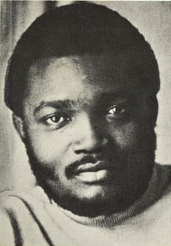
François Luambo Luanzo Makiadi was a Congolese singer, guitarist, songwriter, bandleader, and cultural revolutionary. He was a central figure in 20th-century Congolese and African music, principally as the bandleader for over 30 years of TPOK Jazz, the most popular and influential African band of its time and arguably of all time. He is referred to as Franco Luambo or simply Franco. Known for his mastery of African rumba, he was nicknamed by fans and critics "Sorcerer of the Guitar" and the "Grand Maître of Zairean Music", as well as Franco de Mi Amor by female fandom. AllMusic described him as perhaps the "big man in African music". His extensive musical repertoire was a social commentary on love, interpersonal relationships, marriage, decorum, politics, rivalries, mysticism, and commercialism. In 2023, Rolling Stone ranked him at number 71 on its list of the 250 Greatest Guitarists of All Time.
Sam Mangwana, is a Congolese-born musician, born to Angolan parents. He was the frontman of his bands Festival des Maquisards and African All Stars. Mangwana was a member of François Luambo Makiadi's seminal band TPOK Jazz, and Tabu Ley Rochereau's bands African Fiesta, African Fiesta National and Afrisa International.
L'Orchestra African Fiesta, often known simply as African Fiesta, was a Congolese soukous band started by Tabu Ley Rochereau and Dr. Nico Kasanda in 1963.
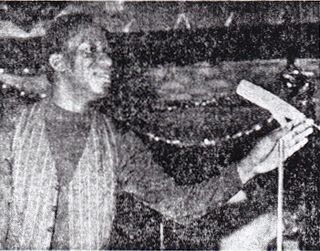
Pascal-Emmanuel Sinamoyi Tabu, better known as Tabu Ley Rochereau, was a leading African rumba singer-songwriter from the Democratic Republic of the Congo. He was the leader of Orchestre Afrisa International, as well as one of Africa's most influential vocalists and prolific songwriters. Along with guitarist Dr Nico Kasanda, Tabu Ley pioneered soukous and internationalised his music by fusing elements of Congolese folk music with Cuban, Caribbean and Latin American rumba. He has been described as "the Congolese personality who, along with Mobutu, marked Africa's 20th century history." He was dubbed "the African Elvis" by the Los Angeles Times. After the fall of the Mobutu regime, Tabu Ley also pursued a political career. His musical career ran parallel to the other great Congolese rhumba bandleader and rival Franco Luambo Makiadi who ran the band TPOK Jazz throughout the 1960s, 1970s and '80s.

Nyboma Mwan'dido, often simply Nyboma, a prominent Congolese soukous tenor vocalist, has been over a fifty-year span a leading member of several outstanding bands, including Orchestre Bella Bella, Orchestre Lipua Lipua, Orchestre Kamale, Les Quatre Étoiles, and Kékélé, in addition to performing and recording as a solo artist. He is widely recognized as one of the best singers in Congolese music.
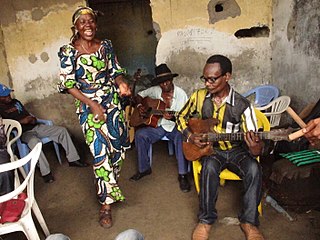
Congolese rumba, also known as African rumba, is a dance music genre originating from the Republic of the Congo and Democratic Republic of the Congo. With its rhythms, melodies, and lyrics, Congolese rumba has gained global recognition and remains an integral part of African music heritage. In December 2021, it was added to the UNESCO list of intangible cultural heritage.
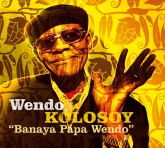
Antoine Wendo Kolosoy, known as Papa Wendo, was a Congolese musician. He is considered the "doyen" of Congolese rumba, a musical style blending traditional Kongolese rhythm and son cubano.
Joseph Kiambukuta Londa, known as Josky Kiambukuta, was a Congolese performing artist, singer, songwriter and composer. As a member of TPOK Jazz he played alongside Franco during their most popular period in the mid-1960s until the late 1980s.
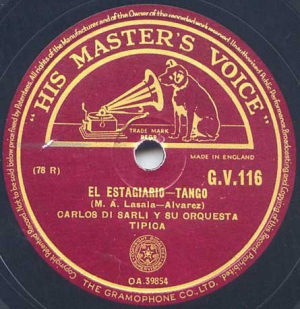
The G.V. Series were a series of 10 inch 78 rpm Gramophone records produced in Europe and the United States from 1933 to 1958, and exported to colonial Tropical Africa. They are credited with introducing Afro-Cuban music into modern African popular culture. The resulting re-interpretations influenced the creation of several genres of African popular music.
Pierre Moutouari is a Soukous singer from the Republic of Congo. A relatively popular and successful soloist during the post civil-war culture boom of the 1970s, Moutouari is one of the few contemporaries of the early Soukous era still at work today.
Gaspard Wuta Mayi, commonly known as Wuta Mayi, is a Congolese rumba and soukous vocalist and composer from the Democratic Republic of the Congo (DRC). From 1974 to 1982, he was a member of the band TPOK Jazz, led by Franco, which dominated the Congolese music scene from the 1960s through the 1980s. Since leaving TPOK Jazz he has recorded and performed as a solo artist, in addition to being one of the four members of the "supergroup" Les Quatre Etoiles, and subsequently a member of Kékélé.

Georges Kiamuangana Mateta, known professionally as Verckys, was a Congolese saxophonist, composer, producer, bandleader, and record executive. A significant figure in the evolution of 20th-century Congolese and African popular music, he is referred to as "Verckys", "Vévé", "the man with the iron lungs" and "Wazola Nzimbu". Kiamuangana was the second Congolese artist to establish and independently manage a record label, Éditions Vévé, through which he brought many Congolese musicians to prominence, including Zaïko Langa Langa, Koffi Olomide, Empire Bakuba, Afrisa International, OK Jazz, Langa Langa Stars, Victoria Eleison, Historia Musica, Orchestre Kiam, and others.
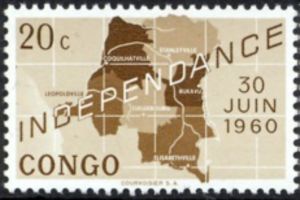
"Indépendance Cha Cha" was a song performed by Joseph Kabasele from the group L'African Jazz in the popular Congolese rumba style. The song has been described as "Kabasele's most memorable song" and one of the first Pan-African hits.
Editions Esengo was a record studio in the Congo, which is noted for assembling to their label Rock-a-Mambo, African Jazz, and Conga Jazz, three of the great powerhouse bands of Congolese rumba. Esengo is taken from the Lingala language, and is the word for "happiness" or "joy."
Radio Congo Belge was a radio broadcaster in the Belgian Congo which played an important role in the early development and popularisation of Congolese rumba music across Africa in the aftermath of World War II.
Bopol Mansiamina, also known as Bopol or Don Paolo, was a prolific and renowned Congolese musician. He recorded and performed extensively over four decades as a solo artist, as a member of leading African bands, and in support of many African musicians. Bopol was best known for his work in the 1980s and early 1990s as one of the four members of the Paris-based supergroup Les Quatre Etoiles and as a solo artist.
Syran Mbenza is a guitarist, originally from the Democratic Republic of the Congo, who has lived in Paris since about 1981. He has recorded and performed prolifically over five decades, including as a solo artist; as one of the four members of the popular soukous "supergroup" Les Quatre Étoiles; as a founding member of the acoustic, Congolese rumba revival band Kékélé; in other bands; and in support of numerous artists. He has been described as one of the greatest guitar players of Africa.
Franklin Boukaka was a Congolese baritone singer, guitarist, and songwriter who is recognized as a pioneer of Congolese popular music. He performed in bands based in each of "the two Congos," i.e., the countries now named the Republic of the Congo and the Democratic Republic of the Congo; toured worldwide; achieved broad popularity; took outspoken political stances; and is widely believed to have been the victim of an extrajudicial execution during an attempted coup in the Republic of the Congo.
Bakunde Ilondjoko, known as Bakunde Ilo Pablo, was a Congolese drummer, musician and composer best known for being a long-time member of Zaïko Langa Langa. His drumming was characterized by his powerful hitting and mastery of the hi-hat.
References
- 1 2 3 4 Rumba on the River: A History of the Popular Music of the Two Congos By Gary Stewart, Chapter 5: "A Change in Mentality"
- ↑ Stewart, Gary (2000). Rumba on the river : a history of the popular music of the two Congos. London: Verso. p. 123. ISBN 1-85984-744-7.
- 1 2 "Rockamambo". Muzikifan.com. 2009-11-01. Retrieved 2010-06-27.